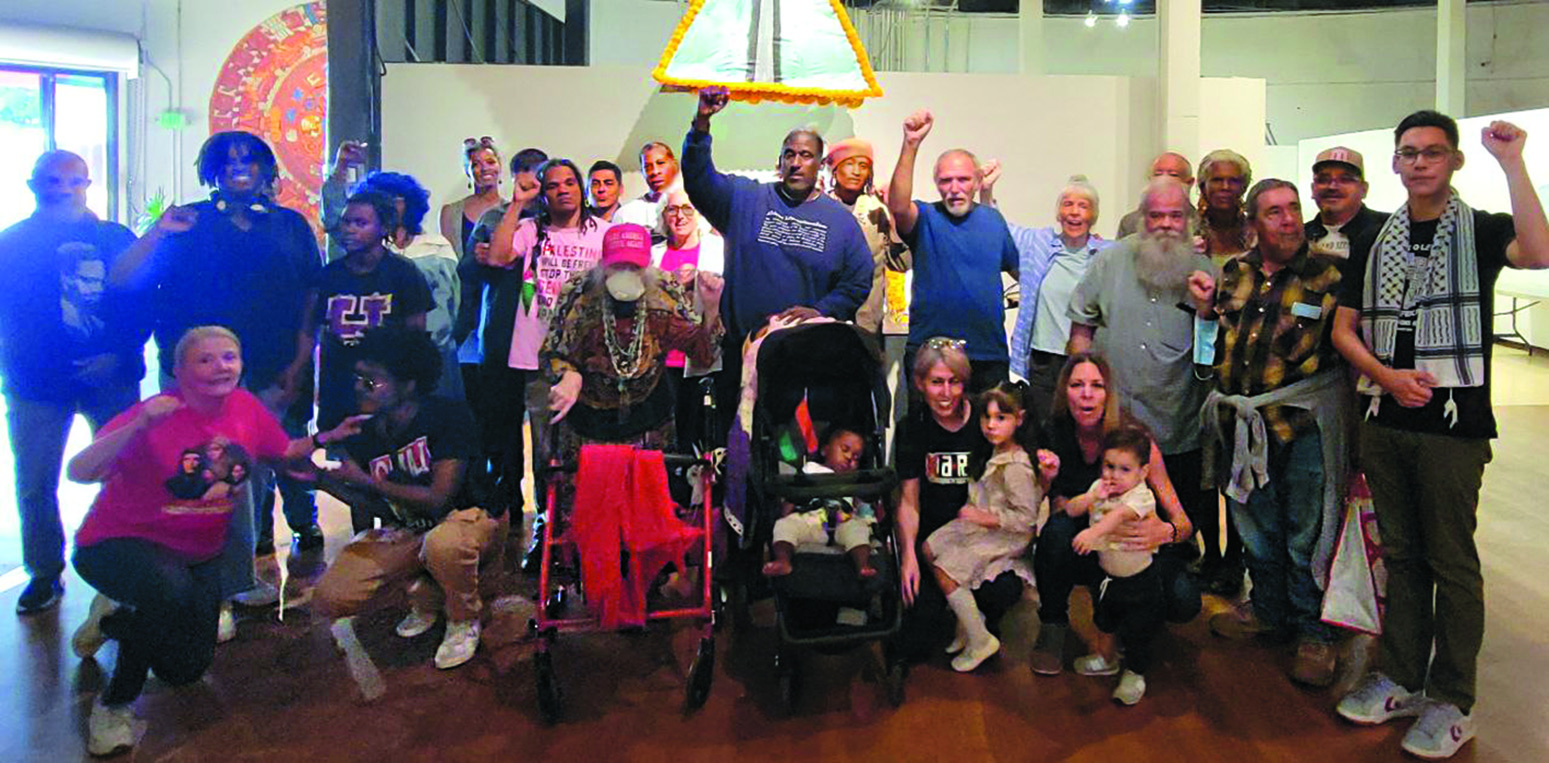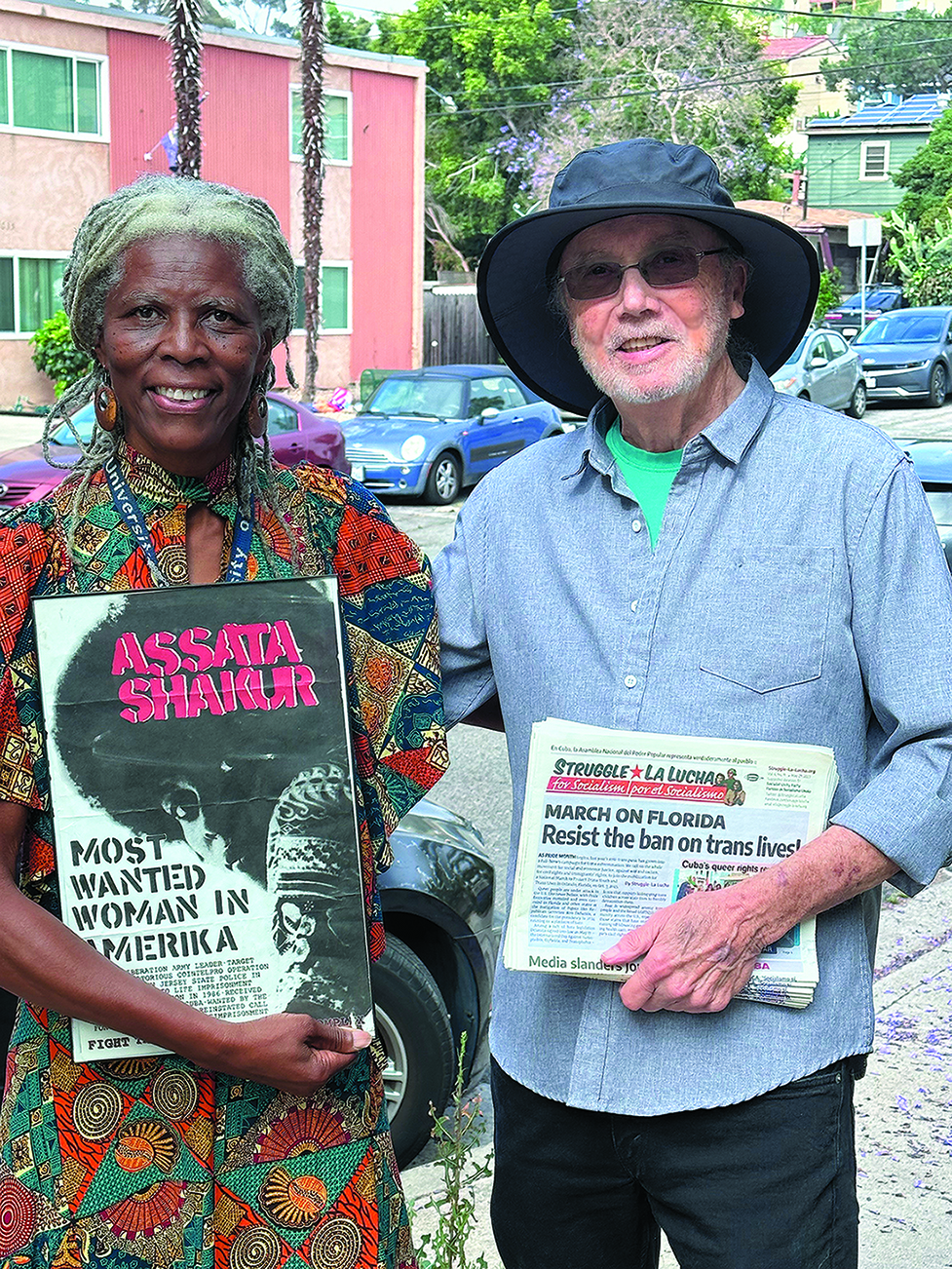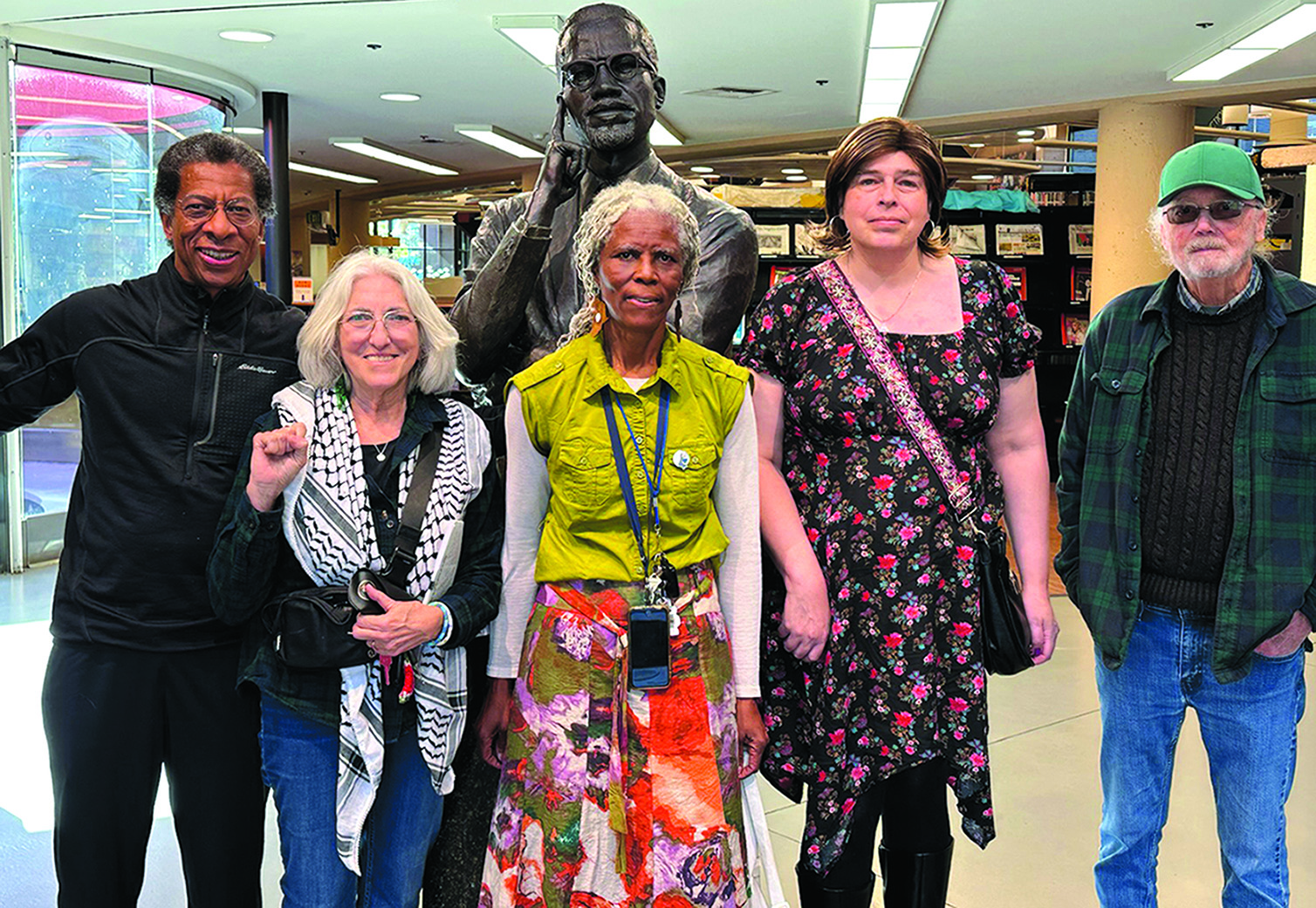Memorial held in San Diego, 2025
Comrades, friends, and family gathered in San Diego to honor the life of Bob McCubbin, a lifelong revolutionary who dedicated over 60 years to the struggle for socialism and liberation. Bob died on Aug. 31, 2025, at age 83, from injuries sustained when he was struck by a car while taking his daily walk through Balboa Park.
Bob McCubbin was a pioneering theorist of LGBTQ liberation, author of the groundbreaking 1976 work “The Gay Question: A Marxist Appraisal,” and a tireless organizer who built branches of revolutionary organization with nothing but knowledge, passion, and commitment. From the Stonewall era through his final days organizing at San Diego Pride 2025, Bob never wavered in his belief that queer liberation was inseparable from the fight against capitalism and imperialism.
An English as a Second Language professor at Southwestern College for 17 years, Bob was equally at home in the classroom and on the picket line. He organized with the Committee Against Police Brutality, ANSWER Coalition, and the Coalition to Free Mumia and All Political Prisoners. He was a founding member of the Struggle for Socialism Party, following the tradition of Sam Marcy, Dorothy Ballan, and Vince Copeland.
Those who gathered to remember Bob spoke of his unwavering principles, his mentorship of young activists, his deep understanding of the national question, and his steadfast solidarity with all oppressed peoples. Above all, they celebrated his profound loyalty to the working class and its march toward revolution.
SELECTED TESTIMONIES
John Parker, Harriet Tubman Center for Social Justice / Struggle for Socialism Party, Los Angeles
They left the photos up. They put up lots of pictures. We did a little altar and things like that — honoring Bob in the tradition of Día de los Muertos, the Day of the Dead, when we remember those who have passed and celebrate their lives. It was just so beautiful — it brought tears to my eyes to know how the working class would come together. Indigenous, Black, Brown, oppressed, poor — come together and just coexist and become a powerful force that’s going to fight against this system.
What does it take to build a branch, the local organizing unit of a revolutionary party? Does it take a large staff? Well, that helps. Does it take lots of money? Well, that definitely helps. But none of these things are required — not for Bob anyway. He created branches and cadres with only the tools of knowledge, passion, and commitment.
His foundation was a deep understanding of the national question — a question that has to be answered for the people in the Global South and all those oppressed by especially U.S. imperialism. For Bob, this was key to unlocking understanding of all types of questions, especially those often ignored.
As the trans community is targeted today, as people in Latin America and the Caribbean are targeted by ICE, as Black and African people are targeted, and as the ruling class experiments with crushing our constitutional rights under Trump’s bulldozer while the Democratic Party enables the push toward fascism — Bob’s legacy is crucial.
What is the legacy of Bob’s life that we inherit? It’s a profound and unwavering loyalty to the working class and its inevitable march toward socialist revolution.
Gloria Verdieu, Coalition to Free Mumia / Struggle for Socialism Party, San Diego
When I visited Bob in the hospital after the accident and saw the extent of his injuries, I was confident he would recover. Bob had no memory of what happened. His concern was that we continued to work on making a better world for all. When I reminded him that he was in the hospital, his response was: “We have a lot of work to do.”
He spoke of Demetrius DuBose, a football player killed by San Diego Police in 1999. He spoke of Mae Mallory and the Harlem Nine, who fought segregation in New York schools. Bob said we must bring working-class people together who fight for a better world. He believed that as workers, we have more in common than the system leads us to believe.
Bob touched the lives of many through bus trips to protests, meetings, conferences, rallies. He was a scholar, educator, author, and mentor who led by example. Bob not only envisioned a better world but motivated me and many others to fight for it — a socialist world.
I met Bob 25 years ago when I first learned about political prisoners. Today, I continue to organize with the Coalition to Free Mumia. Bob was my comrade, motivator, and true friend. He is physically gone, but his revolutionary spirit lives on inside of me.
Dawn Miller, Union del Barrio / Association of Raza Educators
I first met Bob in the late ’90s at an anti-police brutality march in downtown San Diego. Back then, the police would show up in full aggressive force. I remember watching officers physically intimidating Bob, bumping into him, pushing him, threatening to trample him. But Bob never flinched. He kept chanting, kept leading, fearless and unbowed, continuing with revolutionary courage as he did his entire life.
At the end of that march, he invited me to hear his close comrade Leslie Feinberg speak. That night transformed my life. Never before had I heard the truth laid out so clearly — that every form of oppression is rooted in capitalism, and that liberation for queer people and all oppressed people is inseparable from the fight for socialism.
In “The Gay Question,” Bob named the roots of queer oppression in capitalism, showing how the system thrives by dividing workers. He explained not only the nature of our oppression but also the revolutionary strategies necessary to confront it. These works were not just theoretical — they were a call to action, a blueprint for revolutionary solidarity.
Bob fought as a young man to include protections for sexual minorities in his union contract. At a time when being openly gay could cost you your job and your life, Bob refused to hide. He built alliances between the gay liberation movement and the labor movement, proving that solidarity is our greatest weapon.
Maggie Vascassenno, Struggle for Socialism Party, Los Angeles
Bob was a friend. He was a mentor and an organizer. He was a gay man, a leader, a teacher, a theoretician, and a storyteller. Bob was always principled and disciplined, and he never wavered in his commitment to building a working-class movement for socialism. He loved our class and the struggle to free our class. He was a party member and organizer for over 60 years.
As an organizer, he was tireless. He was a full-time teacher, and for years every week he would pick up a bundle of our newspapers at the post office and distribute them to campuses, coffee shops, laundromats, and wherever workers gathered. He organized tons of people to get on the bus to travel to anti-war protests in the Bay Area and Los Angeles.
He was a writer and a voracious reader. He loved his books. His house was full of books — piles of books, books with lots of yellow sticky notes marking different pages and passages. He especially studied human social development and the class origins of women’s and sexual oppression.
Into his 80s, he went to protests and meetings. He still passed out our newspaper and talked with young people about socialism and struggle. He was always looking for a new recruit.
I got to spend a lot of time with him over the last couple of years. I was around as he transitioned from his home of more than 30 years to an apartment in senior housing at St. Paul’s Manor. He loved that the Manor was close to Balboa Park. He walked a mile or two there every morning and then went for his reward — a cafe mocha at some cafe in the park.
I remember once when we were trying to figure out a class schedule for our new candidate comrades, Bob interjected firmly: “Comrades, the best education is in the struggle.”
That’s our Bob. Live like Bob.
Lallan Schoenstein, Struggle-La Lucha Graphics Editor
Bob was a trusted comrade and a cherished friend for 50 years. He used scientific analysis based on Marxist methods to explore the basis of social oppressions. How did society reach a place where a few individuals can amass the wealth created by all working people to commit genocide? How can they create the lies to convince us that genocide is okay?
Bob challenged those feminists whose ideas are based on blaming “the patriarchy” and men for social relations that all people suffer under. Bob wrote about the root of social relations, starting with human history — millions of years when people depended on each other for survival. They needed each other to survive.
Now, more and more people are losing their food and shelter. The Supreme Court has just allowed Trump to freeze SNAP benefits. Capitalism in this recent epoch thrives on division.
Bob was a gay communist — words the capitalist culture tries to make dirty. Bob’s life was spent fighting for socialism, for a world where every child could reach their full potential and be exactly who they are.
Gary Wilson, Struggle-La Lucha Managing Editor
I first met Bob in 1974 in Boston. A federal court had just ordered desegregation of Boston’s public schools, and the city erupted in racist violence. School buses carrying Black children were being stoned. We were organizing the historic March Against Racism on Dec. 14, 1974, which brought together 25,000 people.
Bob came up from New York City to help organize that march and stayed at my apartment. What struck me most was how deeply Bob understood that fighting racism was central — not secondary — to the struggle for liberation. For Bob, the fight against racism was inseparable from the fight for LGBTQ liberation, workers’ rights, women’s equality, and justice.
That spirit carried through everything he did, from his groundbreaking book “The Gay Question” to his lifelong organizing. When I think of Bob, I remember a teacher — someone who showed by example that solidarity is at the heart of revolution. That’s how I first knew him, and that’s how I’ll always think of him.
Matsemela Odom, African People’s Socialist Party / Uhuru Movement
Some important principles I learned studying with Bob: fighting against spontaneity, fighting against opportunism. We know that opportunism is the willingness to forego the overall objectives of a struggle for an immediate gain. And Bob stood up against that.
When the Uhuru Movement was attacked in 2022, Bob was among the first here in San Diego to show his support, donating money and resources. Bob wasn’t rich. He just poured all his resources into the struggle.
People from the queer community have made important advancements to the overall revolutionary struggle in understanding what family is. It’s even more important to understand that Bob reproduced through revolutionary struggle. That’s what he learned from his mentors, who went down to the worst parts of the South before the liberal left got into the Civil Rights struggle. It’s around the national question that they learned to step out and challenge the opportunism built into white nationalist Americanism. That’s what Bob and his generation importantly turned against.
Melinda Butterfield, Struggle for Socialism Party, New York City
A few years ago, Bob was the first comrade I came out to as a trans woman. It felt like the right thing to do. I was nervous because of the weight of the thing. Bob listened thoughtfully as I explained my name, pronouns and plans for coming out. He was kind and supportive, just as I expected. Despite his health limitations, he didn’t hesitate to offer me any support I might need. That conversation was such an important moment for me.
Our late comrade Leslie Feinberg is lovingly regarded in the trans and queer movement worldwide. Bob was a mentor to Leslie. Bob was an example for Leslie. Bob helped pave the way for Leslie. They shared a hatred of racism, imperialism, and Zionism, and deep dedication to LGBTQIA+ liberation.
In Bob’s most recent book, “The Social Evolution of Humanity,” he devoted a chapter to Leslie Feinberg’s work on the materialist understanding of transgender people and trans liberation. What he didn’t mention, in his characteristic modesty, was how his own work helped make Leslie’s work possible, just as the work of Frederick Engels, August Bebel and Dorothy Ballan did for him.
Bob embodied Sam Marcy’s phrase: “Mild in manner, bold in matter.”
Scott Scheffer, Struggle for Socialism Party, Los Angeles
I visited Bob while he was in the hospital. When I came into the room, he couldn’t remember my name, but he told the nurses, “I’ve known him since 1977.”
In 1977, Bob came to Rochester to speak about “The Gay Question.” I helped organize the meeting, and afterward we had a chance to talk. It was all political — he was explaining all the different forms of oppression under capitalism.
After learning from Bob and Leslie Feinberg’s writings, I realized there’s nothing natural about bigotry. There’s nothing about homophobia that’s natural. It’s inherited under capitalism. If you read Bob’s books carefully, that leads you to understand that the struggle against sexual oppression, against racism, against violent misogyny — all of that is struggling against things that originated under capitalism.
Bob’s work explaining the different historical stages showed that each social system came into being because it fit the needs of production at the time, and when it became outdated, it was time for a new social system.
Thank you, Bob McCubbin, for helping me understand that sexually oppressed people are real, and that every struggle we are part of is because of capitalism, and we have to bury capitalism.
Forest, Party for Socialism and Liberation / ANSWER Coalition
I stand here today in solidarity, in mourning, and in celebration of a dedicated, passionate, principled man. Bob McCubbin lived and breathed for the movement. He led by example, and he will continue to move people to action.
On behalf of the Party for Socialism and Liberation and the ANSWER Coalition, I extend our warmest embrace regarding the passing of Bob McCubbin. We need more people like Bob — people who are ahead of their time, who can look backward at history with clarity, analyze the current moment with sincerity, and decide to do something about it.
Bob McCubbin knew what it meant to be a comrade and showed us how to walk in that way. We’re stronger today because of Bob, and we see with more clarity today because of Bob.
Sharon Black, Struggle for Socialism Party, Baltimore
People in Cuba knew about Bob’s writings and were inspired by them. There was going to be a new definition of what family is in Cuba — progressive and amazing. We were planning to go there to do a book signing, and Bob was going to come. I was so sorry that he couldn’t make the trip. His work had international reach and showed how revolutionary theory can inspire movements across borders. Bob’s dedication to building solidarity across all struggles, from the Black Panther Party to Cuba to the fight for LGBTQ liberation, exemplified what it means to be an internationalist revolutionary.
Bob McCubbin, presente!
A second memorial will be held in New York City in early spring 2026.
Join the Struggle-La Lucha Telegram channel





